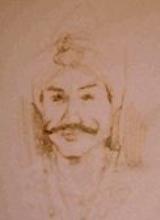
History of Singapore
Overview
The history of Singapore dates to the 11th century. The island rose in importance during the 14th century under the rule of Srivijayan prince Parameswara
and became an important port until it was destroyed by Acehnese raiders in 1613. The modern history of Singapore
began in 1819 when Englishman
Sir Thomas Stamford Raffles established a British
port
on the island. Under British colonial
rule, it grew in importance as a centre for both the India-China trade
and the entrepôt
trade in Southeast Asia, rapidly becoming a major port city.
During World War II
, Singapore was conquered and occupied by the Japanese Empire
from 1942 to 1945.
Parameswara (sultan)
Parameswara , also called Iskandar Shah or Sri Majara, was a Malay-Hindu prince from Temasek who founded the Malacca Sultanate around 1402.-Etymology:...
and became an important port until it was destroyed by Acehnese raiders in 1613. The modern history of Singapore
Singapore
Singapore , officially the Republic of Singapore, is a Southeast Asian city-state off the southern tip of the Malay Peninsula, north of the equator. An island country made up of 63 islands, it is separated from Malaysia by the Straits of Johor to its north and from Indonesia's Riau Islands by the...
began in 1819 when Englishman
England
England is a country that is part of the United Kingdom. It shares land borders with Scotland to the north and Wales to the west; the Irish Sea is to the north west, the Celtic Sea to the south west, with the North Sea to the east and the English Channel to the south separating it from continental...
Sir Thomas Stamford Raffles established a British
United Kingdom
The United Kingdom of Great Britain and Northern IrelandIn the United Kingdom and Dependencies, other languages have been officially recognised as legitimate autochthonous languages under the European Charter for Regional or Minority Languages...
port
Port
A port is a location on a coast or shore containing one or more harbors where ships can dock and transfer people or cargo to or from land....
on the island. Under British colonial
Colonialism
Colonialism is the establishment, maintenance, acquisition and expansion of colonies in one territory by people from another territory. It is a process whereby the metropole claims sovereignty over the colony and the social structure, government, and economics of the colony are changed by...
rule, it grew in importance as a centre for both the India-China trade
Trade
Trade is the transfer of ownership of goods and services from one person or entity to another. Trade is sometimes loosely called commerce or financial transaction or barter. A network that allows trade is called a market. The original form of trade was barter, the direct exchange of goods and...
and the entrepôt
Entrepôt
An entrepôt is a trading post where merchandise can be imported and exported without paying import duties, often at a profit. This profit is possible because of trade conditions, for example, the reluctance of ships to travel the entire length of a long trading route, and selling to the entrepôt...
trade in Southeast Asia, rapidly becoming a major port city.
During World War II
World War II
World War II, or the Second World War , was a global conflict lasting from 1939 to 1945, involving most of the world's nations—including all of the great powers—eventually forming two opposing military alliances: the Allies and the Axis...
, Singapore was conquered and occupied by the Japanese Empire
Empire of Japan
The Empire of Japan is the name of the state of Japan that existed from the Meiji Restoration on 3 January 1868 to the enactment of the post-World War II Constitution of...
from 1942 to 1945.
Quotations
"... the worst disaster and largest capitulation in British history". - Winston Churchill|Winston Churchill referring to the surrender of the British forces by General Arthur Ernest Percival|Arthur Ernest Percival to General Tomoyuki Yamashita|Tomoyuki Yamashita's Japanese Imperial Army on 15 February 1942 in Singapore, which marked the beginning of three and a half years of Japanese Occupation of Singapore|Japanese Occupation of Singapore
![]()

